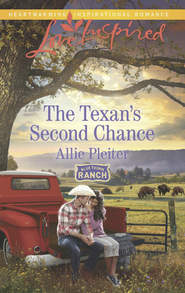По всем вопросам обращайтесь на: info@litportal.ru
(©) 2003-2024.
✖
His Surprise Son
Автор
Год написания книги
2019
Настройки чтения
Размер шрифта
Высота строк
Поля
It wasn’t a scheme, and it wasn’t little. “The man just bought a sandwich from you, didn’t he? Everybody’s got to eat,” she assured the woman. “The day before the wedding, the day after the wedding, the day they drive into town. Weddings and wedding guests mean business. For you as much as for Kelly’s flower shop or Yvonne’s bakery.”
“You’re banking an awful lot on this pipe dream, Your Honor.” Wanda’s harrumph practically spilled out of the phone receiver to douse Jean’s resolve.
Your Honor. Wanda never meant it as a term of respect whenever she said it. Jean put her elbow on her desk and rested her head in her hands while Wanda went on about some other complaint—the woman seemed to have a never-ending list of them.
Jonah looked up from his coloring sheet across the desk from her, catching his mother’s action and expression. “O-K?” The small fingers of his right hand formed the letters in sign language. His open hand moved toward his mouth, his thumb touching his chin in the sign for “Mom?” One little dark eyebrow furrowed in worried inquiry.
She smiled at him and made the sign for “fine” and “tired.” Then, with what she hoped was a playful smile, she added the sign for “hungry.”
“Me, too,” Jonah’s signs replied. His smile was as sweet as the grandfather he was named after. “Home soon?”
“I hope,” she signed in return, grateful Wanda couldn’t hear any of the conversation. “Our first bride is here for a visit, Wanda,” she said into the phone. “Let’s all welcome her the best we can.” They’d had some version of this conversation nearly every week since last fall, when the town council approved Jean’s proposal to change the town’s name and become a wedding destination.
Was it extreme to change the name of the town, the streets and half the businesses? It was, but so was the rate at which the tiny town was suffocating under a dying economy. Tobacco was long gone, the mills had slowed and then closed, and nothing had ever replaced them. Something had to be done before there was no town at all. Weddings were what she loved, what she knew, so when the idea came to her she ran with it. Because that’s what Matrims did.
Jean looked up at the portraits of her father and grandfather as Wanda droned on. I did what I had to do to make everything work out, Grandpa. Grandpa Jake had founded Matrim’s Valley in the early 1900s, opening up the textile mill that transformed the loose collection of mountain tobacco farms into a bustling mill town. He even became Matrim’s Valley’s first mayor. “Built his mill and this town out of sheer grit and an unwillingness to ever admit defeat,” Dad used to say of Grandpa Jake.
Her father, Jonah Matrim, had taken over the mill, and later the mayor’s office, not long after her mother’s death from an infection when Jean was in her teens. But even Matrim grit couldn’t outrun a failing economy, and eventually the mill had closed the summer Jean graduated and moved to California with Josh. Dad tried mightily to keep the valley together, but it was as if something inside him that had started to die when Mom did continued to die with the mill. As if his own health depended on the town’s. Her new residence clear across the country hadn’t helped, either.
Josh proposed the day SymphoCync officially opened its offices that July, and for a while they were happy. Still, Silicon Valley’s excess quickly began to taste sour in light of her beloved valley’s demise. Dad had given his all as Matrim’s Valley’s mayor, and here she was, thousands of miles away, doing nothing she could count as important. Her dad loved her, doted on her, needed her, while in San Jose she was fortunate to get fifteen minutes of Josh’s attention.
At first, Jean thought she was homesick. Or at least missing her dad. Dad and home called to her with a stronger and stronger voice until she finally went “for a good long visit.”
She never returned to California, even when she discovered she was pregnant. The life inside her seemed to give Dad hope, helping him to improve. Dad loved Jonah in a way Jean had come to doubt Josh ever could. Especially when he was born, and maybe more so when they learned Jonah couldn’t hear three months later. She never told Josh about his son, for reasons he’d now have to learn. Life was full of hard and painful choices. And even though such regrets drew her to finally discover the faith her father had, they still haunted her.
Failing health, like a failing economy, won out once more over Matrim grit. The pleasure Wanda’s husband, Wayne, took in stepping in as acting mayor when Dad’s health forced him to step down always bothered her. Still, with a toddler and an ailing father, it wasn’t as if she could do anything but thank Wayne for his willingness to serve.
Except that Wayne’s “service” had been a disaster. His single inept two-year term felt like one long stretch of everyone bickering while waiting around for things to get better. Someone needed to call a halt to the complaining and motivate people to do something. She was the last Matrim in Matrim’s Valley. So when she dreamed up a solution—a drastic one, yes, but a solution—she bolstered up her courage and ran for mayor on a “Matrimony Valley” platform.
It took a while and lots of convincing, but eventually enough of the valley voted to support her. It seemed if she was willing to go so far as to swap out her family’s name to give the valley a new chance at survival, everyone was willing to give it a try.
Well, almost everyone. “Did you hear me?” Wanda’s sharp tone startled Jean out of her thoughts.
“I’m sorry, Jonah was asking for something.”
Another snort of disapproval from Wanda. “A child playing in the mayor’s office. Honestly. Wayne never did that sort of thing.”
The “mayor’s office” had been Wayne’s idea, and consisted of a walled-off corner of the civic building that served as library, town hall, utility office and police station. I will not be the Matrim who lets this valley die on my watch. She would have liked to run the mayor’s office out of the front room of the Matrim family home like Dad and Grandpa did—it certainly would make life as a single mother easier—but Wanda had talked the council into keeping the “improvements” Wayne had implemented. And in all honesty, this office was the safest place for Jonah to be next to his own home. Everyone here looked out for him.
Dredging up her last shred of diplomacy, Jean offered, “Thank you for taking such good care of Mr. Tyler. You know, Violet mentioned her groom was looking for somewhere to hold a casual get-together for his groomsmen before the wedding. Should I tell her yours would be the best place to feed a bunch of navy sailors?”
Wanda’s tone softened. “I suppose I could manage that.”
That was likely as close to cooperation as Wanda would ever get, so Jean chose to take it. She put a smile on her face and gave Jonah a “thumbs-up” sign. He grinned and gave her one right back.
Jonah. The joy of her life. She wanted him to have a valley to come home to, just as she had. He was the reason she fought to keep all this family heritage up and running.
As Jean ended her call with Wanda and packed up the beautiful felted wool bag she used as her “mayoral briefcase,” she looked out the window. Tomorrow, she would deal with the tangle of Josh Tyler and how it might complicate the valley’s first wedding. She would find a way through this, because even though this was no longer Matrim’s Valley, she was still a Matrim.
So was Jonah. Taking her son’s hand, Jean and her son blew a kiss to her father’s and grandfather’s portraits as she led him out of the office. Lend me your strength, she pleaded to the men who’d served before her. As she headed out into the evening air, Jean sent the same prayer up to her heavenly Father, as well.
It shouldn’t have surprised her that Josh Tyler was standing in the middle of the street waiting for her. Patience had never been Josh’s strong suit. He stared long and hard at Jonah. Josh’s brain at full speed was an almost visible thing—his whole body nearly hummed with energy when his thoughts whirred into action. It had been one of the things that drew her to Josh, and it startled her that she could pick up on it so strongly after so many years had passed. It was as if her own heart could feel the chronological calculations going off like grenades in his head.
“Twenty-four Falls Lane,” she said to him, pointing down the avenue. “The house with the green shutters. He goes to sleep at eight, so come by at nine.”
“Jean...” he started to say, but she shook her head.
“No, not now.” She turned as quickly as she could, heading Jonah toward home, feeling the rush of history as strongly as the fierce current of the falls.
Chapter Three (#uf7516e7b-8d45-5ff2-9900-e6ef51831b73)
A soft knock came on her front door at 8:55 p.m.
She’d always known this day was coming. It had to come. Josh had a right to know he had a son, and Jonah had a right to know his father. She hadn’t been strong enough to face up to the situation back then, and she was sorry for that. But she was a different person now, a stronger woman. The question was, was Josh a different man?
Lord, I sure hope You know what You’re doing. I couldn’t feel less ready to do this, but I’m going to trust You. Guide my words. Guard his response. He’ll be angry. He has a right to be. But Josh is here, now, and I want to believe I’m strong enough to make this turn out okay for Jonah.
As she opened the door, his eyes told her immediately. He knew. Regret and remorse pushed down on her shoulders, a sudden weight that made her grieve over the choice she’d made back then to withhold word of Jonah from Josh.
Here we are. Stand, Jean. Stand and face it head-on. She could almost hear her father’s words from somewhere deep inside.
“Why don’t you come inside, Josh.”
He didn’t move. “Is he?”
She hadn’t expected him to blurt it out like that—as if the question hurled out of him beyond his control. Then again, she’d lived with the certainty for nearly six years, and he looked as if he’d lived with the possibility all of six minutes.
Jean pulled in a slow breath, gathering her strength and willing calm into her voice. “Come inside, Josh.”
He came through the doorway, stopping to stare at a photo of Jonah she kept on the hall table. It was one of her favorite photos of her son, bobbing up with glee out of the water at the swimming hole, all wild hair and bright eyes. Josh stared at it, hard, his whole body on edge. He picked up the photo. “Is he? Mine?”
How many years had she pondered her response to the huge moment that question was asked? “Yes, Josh, he’s ours.”
He held the photo up toward her. “Ours? He’s not ours, he’s yours. How could you sit there and call him ours if you never even bothered to tell me?”
“It’s complicated. Come into the kitchen and let’s sit down.”
He followed her into the kitchen, still clutching the photo. “I have a son. This boy...is...my son.” He turned in a slow circle, raking his free hand through his hair before he sank into one of the chairs at her kitchen table. Not because she’d asked him to sit down, she felt, but because the power of the moment wouldn’t allow him to stay standing.
“I’ve known I was going to have to tell you one day,” she said as she took the chair opposite him. “I just planned on having a bit more time to figure out how to do it right.”
“Right?” he snapped at her choice of words. “Doing it right would’ve been, how about—I don’t know—six years ago.”
“He is five. And I am sorry.” She owed him that much. She owed him an explanation and an apology for what she’d done, even though she doubted he’d accept it at the moment. “California was a mistake. We were caught up in something that wasn’t strong enough to last. We became different people once everything started for you out there.” That seemed true for him, from her perspective. Had she changed as well without realizing it? Or had Dad’s illness just realigned her priorities? “We weren’t ready to be married to each other, and not at all ready to be parents. Not the way your life worked out there.” You were consumed with work, she thought, but chose not to say.
“Are you kidding me? Everything was starting for us. You came out there with me. You said you’d marry me.”
“I loved you. I loved who you were in school, back when all the success was bright and shiny. Once it became reality—the twenty-hour workdays, the crazy social circles—you had to know that wasn’t ever really me, even back then. I knew I’d be alone. Married, but alone.”











